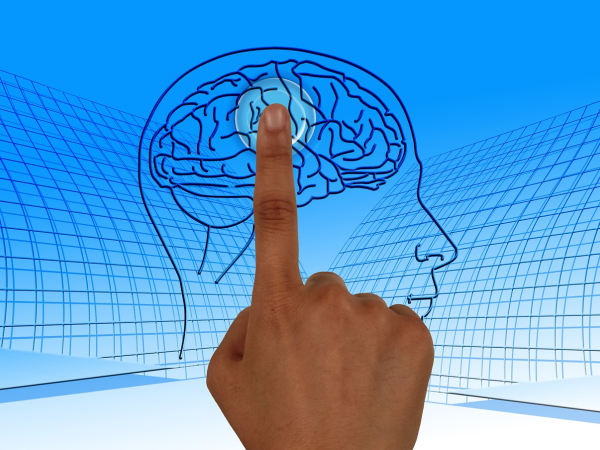IBS is subdivided into subgroups according to the predominant mode of emptying, as this is the basis for subsequent therapy. This means that IBS is a heterogeneous disease and it is likely that different causes are dominant in each subgroup of IBS. Initially, research focused mainly on changes in intestinal motility and visceral sensory function, which are certainly important in explaining the mechanism of the disease. But more recently, research has moved more towards elucidating why and how these changes occur in the first place. The roles of various causes such as the gut-brain axis (psyche), genetic factors, infections, changes in the gut microbiota, abnormalities in serotonin metabolism, inflammation of the gut, immune activation, changes in gut permeability, changes in bile acid metabolism, the influence of diet, etc. are being investigated.
Brain-gut axis
Patients suffering from IBS have a higher incidence of mainly anxiety and depression. This has led to the fact that for a long time, IBS has been considered a primary brain-gut dysfunction, even to the point of somatization of psychological difficulties (disturbances in the psyche are the cause of gastrointestinal and other symptoms)1. In more recent population-based studies of IBS, there are also data suggesting that the relationship between the psyche and the gut in IBS is bidirectional and that approximately half of patients develop functional gut problems first and psychiatric disorders develop later 2,3. Therefore, in this group of patients, the chances are that proper treatment of irritable bowel syndrome will also improve psychiatric disorders.
On the other hand, in the remainder of patients who suffer from psychological difficulties, it is these difficulties that precede the development of IBS. Based on epidemiological data, it is possible to see, for example, a higher incidence of IBS in people with a history of childhood abuse or maltreatment compared to the general population. Other studies suggest that these people may have an overreaction of the nervous system in the digestive tract to common stimuli.
Therefore, it is correct to assume that this relationship is bidirectional, with the possibility that in some patients the primary trigger may be psychological and in others, it is just a consequence of IBS.
Genetic factors
An increasing number of different genetic polymorphisms are associated with irritable bowel syndrome. Some genes related to immune regulation, epithelial barrier function, bile acid synthesis, cannabinoid receptors, etc. may increase the chance of developing IBS4. Activation and deactivation of various genes during life are also thought to have an impact on the development of the disease.
Infection and alteration of the intestinal microflora
Especially in the diarrhoeal form of irritable bowel syndrome, it is possible to detect intestinal infection before the onset of IBS symptoms. Therefore, this form is also known as Post-Infectious Irritable Bowel Syndrome (PI-IBS). The prevalence of PI-IBS after intestinal infection is estimated to be approximately 10 % 5. Infection with the parasite Giardia lambialis or other protozoa poses the highest risk of development6. It is likely that in this type of IBS, a mild chronic inflammation persists in the intestinal mucosa after infection, which gradually triggers a cascade of changes.
Changes in the intestinal microflora in terms of dysbiosis (reduced number of beneficial bacteria and increased number of pathogenic bacteria), less diversity of bacteria, etc. can often be observed in IBS patients. For example, the amount and activity of Lactobacteria and Bifidobacteria (beneficial strains of bacteria) are significantly lower in IBS 7.
Change in bile acid metabolism
Some patients, especially those with the diarrhoeal form of irritable bowel syndrome, have a change in bile acid metabolism, in the form of increased bile acids in the stool. This may be due to an overproduction of these acids or poor reabsorption in the intestine and consequently the excess acid accelerates the intestinal passage.
Of course, these are not all the factors involved in the development of irritable bowel syndrome. In each group of patients, the ratio of influences is different. Therefore, irritable bowel syndrome in terms of the causes of its occurrence is not one disease, but a group of diseases that have similar manifestations.
1 Tanaka Y, Kanazawa M, Fukudo S, Drossman DA. Biopsychosocial model of irritable bowel syndrome. J Neurogastroenterol Motil 2011; 17: 131–39.
2 Wessely S, Nimnuan C, Sharpe M. Functional somatic syndromes: one or many? Lancet 1999; 354: 936–39.
3 Koloski NA, Jones M, Kalantar J, Weltman M, Zaguirre J, Talley NJ. The brain-gut pathway in functional gastrointestinal disorders is bidirectional: a 12-year prospective population-based study. Gut 2012; 61: 1284–90.
4 Chong PP, Chin VK, Looi CY, Wong WF, Madhavan P and Yong VC (2019) The Microbiome and Irritable Bowel Syndrome – A Review on the Pathophysiology, Current Research and Future Therapy. Front. Microbiol. 10:1136. doi: 10.3389/fmicb.2019.01136
5 Klem, Fabiane, et al. "Prevalence, risk factors, and outcomes of irritable bowel syndrome after infectious enteritis: a systematic review and meta-analysis." Gastroenterology 152.5 (2017): 1042-1054.
6 Wensaas KA, Langeland N, Hanevik K, et al. Irritable bowel syndrome and chronic fatigue 3 years after acute giardiasis: historic cohort study. Gut 2012;61:214-9.
7 Bellini, M., Gambaccini, D., Stasi, C., Urbano, M. T., Marchi, S., and Usai-Satta, P. (2014). Irritable bowel syndrome: a disease still searching for pathogenesis, diagnosis and therapy. World J. Gastroenterol. 20, 8807–8820. doi: 10.3748/wjg.v20.i27.8807
Holtmann, Gerald J., Alexander C. Ford, and Nicholas J. Talley. "Pathophysiology of irritable bowel syndrome." The lancet Gastroenterology & hepatology 1.2 (2016): 133-146.
